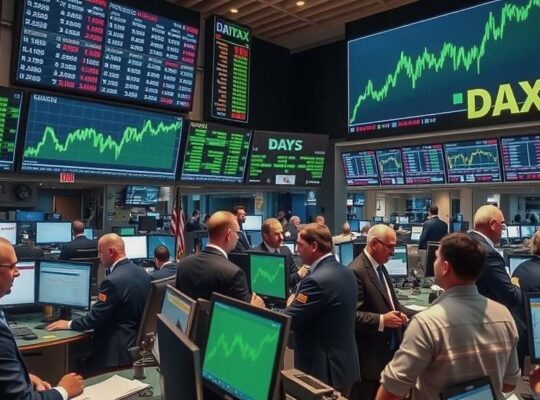Market Sentiment Shifts as DAX Experiences Minor Retreat
The German DAX index registered a slight decline on Thursday, closing at 24,119 points – a marginal decrease from the previous day’s close. Following a brief morning rally, the index dipped below the previous day’s level, exhibiting a pattern of fluctuating sideways movement throughout the trading session. This retreat reflects a broader shift in market sentiment, increasingly influenced by cautious signals emanating from central banks.
Market analyst Andreas Lipkow attributed the DAX’s performance to a “profit-taking mode” among investors. He emphasized that recent pronouncements from central banking authorities, particularly concerning inflation trends, are providing new justifications for a more conservative investment approach. “The potential for a more restrictive monetary policy is removing a crucial propellant from financial markets. This is currently acting as a brake and causing equity valuations to appear in a different light” Lipkow explained. He underscored that this dynamic is especially critical in the United States, highlighting its potential to exert downward pressure on the DAX given the index’s strong correlation with US markets.
The subdued performance follows a period of sustained growth and underscores growing concerns about the vulnerability of European equities to the vagaries of US economic policy. In addition to the influence of US monetary strategy, Lipkow also expressed the growing importance of a positive domestic economic trajectory for the DAX’s long-term resilience. “It’s increasingly important for Germany to see a pickup in economic activity. Otherwise, the reliance on US financial markets could prove detrimental to the DAX.
Scout 24 led the gainers throughout much of the trading day, while Porsche, Deutsche Telekom, Merck and Bayer lagged behind.
In related news, European energy markets exhibited a mixed outlook. Natural gas prices declined, with November delivery falling to €31 per megawatt-hour – a three percent decrease from the previous day. This translates to a potential consumer price of at least eight to nine cents per kilowatt-hour, assuming consistent pricing. Conversely, the price of Brent crude oil edged up slightly, reaching $65.02 per barrel – a 0.2 percent increase.
The Euro also weakened against the US dollar, trading at $1.1562 – a dollar now costing €0.8649. This currency fluctuation adds another layer to the complex economic environment influencing investor confidence and impacting Germany’s export-dependent economy.












